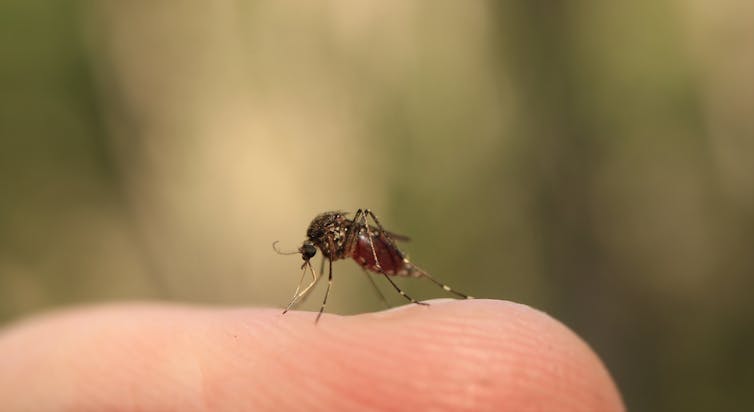Source: The Conversation (Au and NZ) – By Cameron Webb, Clinical Associate Professor and Principal Hospital Scientist, University of Sydney
British soldiers have reportedly been given insect repellent to help protect themselves against COVID-19.
The UK government’s Defence Science and Technology Laboratory released a study showing the citriodiol-based spray can kill SARS-CoV-2, the coronavirus that causes COVID-19, in a lab.
We’re all on the lookout for new ways to get the best protection against COVID-19.
But just because a product is safe to use in its current form, it doesn’t necessarily mean it will provide either safe or sufficient protection against COVID-19.
What is citriodiol?
Health authorities around the world promote mosquito repellents to help protect against mosquito-borne disease.But they don’t work by killing the viruses mosquitoes spread. They stop the mosquitoes biting us in the first place by blocking a mosquito’s ability to pick up on the smells that help them find us.
Read more: Can mosquitoes spread coronavirus?
There are dozens of different insect repellent formulations available, but most recommended products contain one of just a few different active ingredients.
The most common are diethyltoluamide (commonly known as DEET) and picaridin (also known as icaridin). There are also a variety of products that contain plant-based ingredients.
Citriodiol is a somewhat new arrival to the world of commercial insect repellent formulations, but there’s very strong evidence it provides effective protection against mosquito bites.
The chemical name for citriodiol is p-menthane-3,8-diol (commonly referred to as PMD) and it’s derived from the lemon-scented gum (Corymbia citriodora). Despite having origins in plants, citriodiol is considered a chemical repellent like DEET and picaridin.
In Australia, the Australian Pesticides and Veterinary Medicines Authority oversees its use. If you’ve got a citriodiol-based insect repellent, it will say “oil of lemon eucalyptus”, differentiating it from other oil-based repellents, such as tea-tree.
There’s no doubt citriodiol-based repellents provide protection from mosquito bites and health authorities around Australia should routinely recommend them to reduce the risk of mosquito-borne disease.
But could this product repel COVID-19 as well as mosquitoes?

Citriodiol and coronavirus
The UK government’s Defence Science and Technology Laboratory assessed two ways citriodiol may kill SARS-CoV-2.
First, they used citriodiol as an anti-viral agent, applying the product directly to the virus in the lab. And second, they used it as a surface treatment of latex synthetic skin (designed to be like applying the product directly to human skin).
The first set of experiments demonstrated that, when used at a high concentration, the insect repellent killed the virus.
In the second experiments, application of the insect repellent to the latex synthetic skin reduced the amount of virus detected after four hours. But the virus wasn’t completely destroyed.
We need more research to understand how exactly citriodiol might kill the virus. The process may be similar to that of hand sanitisers and other disinfecting products.
These preliminary findings are encouraging but are intended to act as the foundation for future peer-reviewed research. They shouldn’t be grounds for recommending the use of insect repellents containing citriodiol to prevent COVID-19.
Could existing formulations of citriodiol be safe to use?
It’s important to note there are strict warnings provided on the use of citriodiol-based repellents. They shouldn’t be used on children under 12 months of age and, like many other repellents, may cause irritation to eyes or the skin. You certainly shouldn’t be drinking it.
There may well be potential in this product as an anti-viral agent or disinfectant. But for such uses, we’d need alternative registration, packaging, and directions. This may mean a completely different registration process involving other government authorities, such as the Therapeutic Goods Administration.
This is because it’s not just what’s in the product, but how it’s used. If someone was to use an insect repellent as frequently as a hand sanitiser, perhaps the risks of an adverse reaction would increase.
Read more: The best (and worst) ways to beat mosquito bites
There have been previous examples where products with different uses are combined and require different directions to ensure they’re used safely and effectively.
Mosquito repellents that include sunscreen may pose a greater risk if they’re primarily used for sun protection. Sunscreen should be applied more frequently and at greater volumes compared to insect repellents.
The risk of adverse health outcomes from using insect repellents is low, but excessive use should be avoided. These types of products which combine insect repellent and sunscreen are restricted in some countries.
If you want to avoid COVID-19, you’re better off sticking to social distancing, hand hygiene and wearing a mask than reaching for the closest insect repellent.
– ref. Could an insect repellent with citriodiol help fight the bite of COVID-19? Not so fast – https://theconversation.com/could-an-insect-repellent-with-citriodiol-help-fight-the-bite-of-covid-19-not-so-fast-145171





